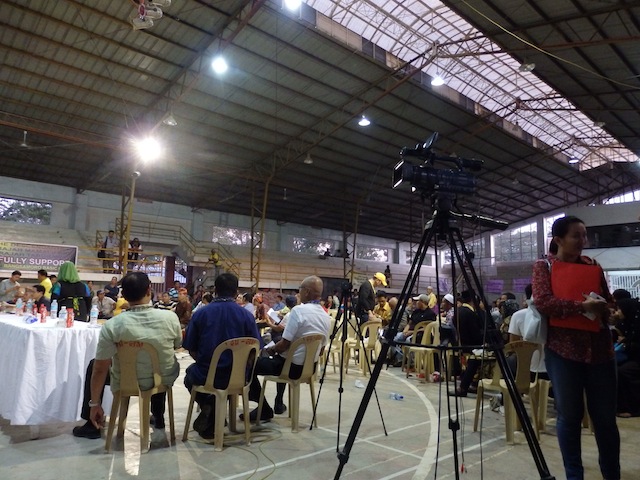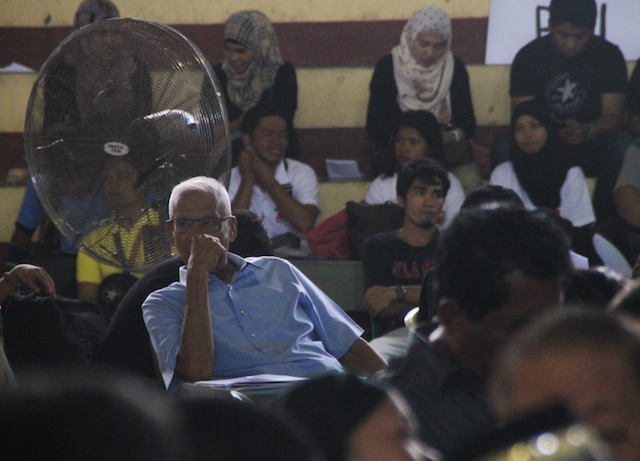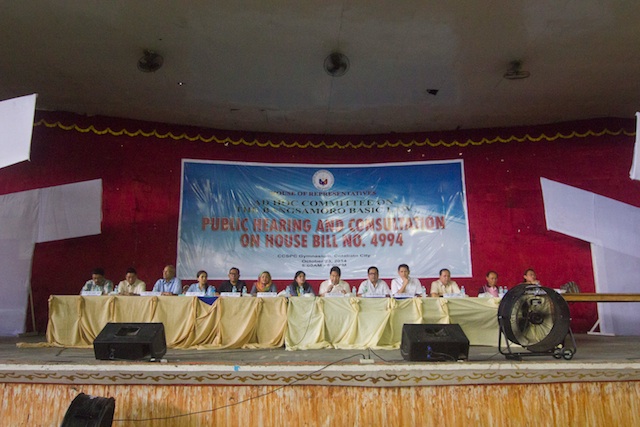COTABATO CITY (MindaNews/26 October) — The House of Representatives’ Ad Hoc Committee on the Bangsamoro Basic Law (AHCBBL) scheduled a three-day one-town, four-city series of public hearings from October 22 to 24 but the first two days were perfect examples of how not to conduct a public hearing.
In Upi, Maguindanao on Wednesday, October 22, the first out of town public hearing of the AHCBBL, the heat from the afternoon sun inside the municipal gymnasium was bearable with the presence of electric fans but the sound system was a problem. Resource persons who spoke on the floor instead of the podium onstage could be heard by the audience but the 11 committee members onstage could hardly hear them.
 Representatives Raymond Democrito Mendoza (TUCP party list), Carlos Isagani Zarate (Bayan Muna) and Muntinlupa Rep. Rodolfo Biazon join the audience at the Upi School Gym during the public hearing on the Bangsamoro Basic Law on October 22. The representatives opted to leave the stage because they could hardly hear what was being said by the resource persons. MindaNews photo by Carolyn O. Arguillas
Representatives Raymond Democrito Mendoza (TUCP party list), Carlos Isagani Zarate (Bayan Muna) and Muntinlupa Rep. Rodolfo Biazon join the audience at the Upi School Gym during the public hearing on the Bangsamoro Basic Law on October 22. The representatives opted to leave the stage because they could hardly hear what was being said by the resource persons. MindaNews photo by Carolyn O. Arguillas
“Di halos marinig” (we could hardly hear them), said Bayan Muna Rep. Carlos Isagani Zarate, who left the Presidential table onstage with TUCP Party List Rep. Raymond Democrito Mendoza to join the audience as Muntinlupa Rep. Rodolfo Biazon earlier did.
Eleven members of the AHCBBL, ten of them Mindanawons, attended the public hearing.
 Public hearing in Cotabato City at the Cotabato City State Polytechic College gymnasium. Participants complained of poor sound system and poor ventilation. MindaNews photo by Toto Lozano
Public hearing in Cotabato City at the Cotabato City State Polytechic College gymnasium. Participants complained of poor sound system and poor ventilation. MindaNews photo by Toto Lozano
The Cotabato City hearing on Thursday, October 23, was more problematic. The initial announcement, based on the Committee’s calendar, was that it would be from 8 a.m. to p. m. Wednesday at the Notre Dame University gymnasium.
As it turned out, the NDU gym was not available so the venue was moved to the
gymnasium of the Cotabato City State Polytechic College. But no public announcement was apparently made because there were less than 20 persons inside the CCSPC gym by 8 a.m. including the Committee Secretariat and MindaNews which learned about the change of venue en route to NDU gym.
Sweat-drenched
Committee members arrived at 8:35 a.m. to find an audience of about 60 and plastic chairs good for at least 300 (bleachers not included; around 50 students were seated there). The hearing finally started at 9:22 a.m. when other participants arrived. But the chairs were moved closer to the stage.
One remarked it was a good thing it wasn’t raining as the old G.I. sheet roofing had holes. But for a gym much bigger than Upi’s but with fewer electric fans, the heat was unbearable.
Several participants were seen moving closer to the industrial fans to dry their sweat-drenched clothes.
The sound system was worse. Resource persons who spoke at the podium onstage using wireless microphone could not be understood until a note was passed to one of the congressmen that the audience could not understand what the speaker was saying. The speeches became clear only when a wired microphone was used instead.
 Muntinlupa Rep. Rodolfo Biazon, retired Marine general and former senator, spent 18 of his 34-year military service in Mindanao. Biazon left the stage and joined the audience at the Cotabato City public hearing on October 23, 2014 due to poor sound system. He did the same thing in Upi, Maguindanao a day earlier, again due to poor sound system. MIndaNews photo by Toto Lozano
Muntinlupa Rep. Rodolfo Biazon, retired Marine general and former senator, spent 18 of his 34-year military service in Mindanao. Biazon left the stage and joined the audience at the Cotabato City public hearing on October 23, 2014 due to poor sound system. He did the same thing in Upi, Maguindanao a day earlier, again due to poor sound system. MIndaNews photo by Toto Lozano
But while the audience could now hear the speakers clearly, the Committee members at the Presidential table onstage could not, prompting Biazon to go down and join the audience again.
The resource persons were asked to use the microphones on the floor. Committee members onstage could now hear them clearly but the audience could not.
Aside from problems on venue and the sound system, the quality of the hearings was another problem.
No guidelines; English as main language
Committee chair Rep. Rufus Rodriguez’ only guideline was to give each speaker five minutes. There was no strict timekeeping, however, so some spoke beyond the time limit.
No guideline was also issued on what language to use. When the hearing started at :15 p.m at the Upi School Gym on October 22, a teacher approached the secretariat to request that Committee members speak in Filipino rather than English, so that majority of the people could understand. The proceedings were aired live by the town’s radio station, DXUP, so even those who could not make it to the gym could listen to the radio instead.
Unfortunately, while many spoke in Filipino, English was still the dominant language used by both Committee members and resource persons. Position papers submitted to the Secretariat were also mainly in English .
Also, most of the speakers delivered position papers like there was no draft law yet. Only Timuay Santos Unsad of the Timuay Justice and Governance presented specific articles and sections where they had concerns, and offered their “proposed alternative provisions.”
Devise ways
Lawyer Benedicto Bacani of the Cotabato City-based Institute of Autonomy and Governance said he is “not sure whether the Ad Hoc Committee has heard the broadest range of stakeholders in the public hearing in Cotabato.”
“The local officials of Cotabato City were conspicuously not there. Many of those who spoke are the same ones who appear in public hearings in Manila and in Upi. I wonder whether the problem is on organization of the hearings. Even at the last minute, I heard that people were still not sure about the venue.”
 Public hearing on the Bangsamoro Basic Law, Cotabato City, 23 October 2014. MindaNews photo by Toto Lozano
Public hearing on the Bangsamoro Basic Law, Cotabato City, 23 October 2014. MindaNews photo by Toto Lozano
Bacani warned that the hearings are “not just for the ‘converted’ and the ‘supporters’ of the bill.” He urged the Committee to “devise ways by which all voices are heard.”
Unsad lamented that towards the end, the presentations had become “low-level” as IP speakers made personal attacks on fellow IP speakers.
Other resource persons, he said, had no clear propositions.
Proposals
Unsad said he considers “positive” the fact that they were able to present their proposals to the Committee; that there was appreciation and consideration of their proposals; that all of them were able to present their propositions; and that the IPs were substantially represented.
“Positive din sa amin ang ginawa ng other bloc dahil napatunayan ng Ad Hoc Commitee na may suppression sa hindi Islam at hindi miembro ng MILF na mga IPs” (What the other bloc did also turned positive as it was proven to the Ad Hoc Committee that there is suppression of non-Islamized and non-MILF IPs), he said.
Unsad stressed that their assertion to entrench their rights guaranteed by the =UN Declaration on the Rights of Indigenous Peoples (UNDRIP) and the 1987 Philippine Constitution as expressed by the Indigenous Peoples Rights Act “does not mean we do not like the Bangsamoro. W
 Public hearing on the Bangsamoro Basic Law, Cotabato City, 23 October 2014. MindaNews photo by Toto Lozano
Public hearing on the Bangsamoro Basic Law, Cotabato City, 23 October 2014. MindaNews photo by Toto Lozano
hat we want is that after Congress enacts the Bangsamoro Basic Law, it will be smooth sailing. We will guard this against the peace spoilers. We do not want any loopholes in the BBL so that no one can question it in the Supreme Court.”
Rodriguez described the Upi meeting as “historic” as it was the first out of Manila public hearing on the BBL.
Singing, campaigning
It also made history, according to Rodriguez, for being the first public hearing where a district representative – North Cotabato Rep. Nancy Catamco, chair of the House Committee on Indigenous Peoples – sang.
Catamco, an Obo Manobo, sang three songs on Unity and Peace with her three-man band of fellow Obo Manobos.
The singing took all of 18 minutes although admittedly, it broke the tension after B’laan Datu Antonio Kinoc, an IP alternate member of the MILF peace panel asked the Committee to delete from the record the presentation of Commissioner Froilyn Mendoza of the Bangsamoro Transition Commission, the body that drafted the Bangsamoro Basic Law.
Rodriguez denied Kinoc’s proposal. (see other story)
The hearing ended with individual closing statements of the Committee members but was marred by Misamis Occidental Rep. Jorge Almonte’s campaign pitch for Biazon to be returned to the Senate and for Rodriguez, the committee chair who is serving his third and last term as Representative, to run for the Senate.
Almonte repeated the same campaign spiel in Cotabato City the next day. (Carolyn O. Arguillas / MindaNews)
